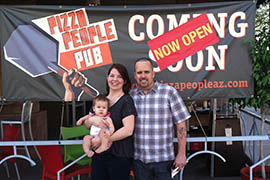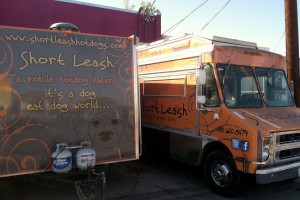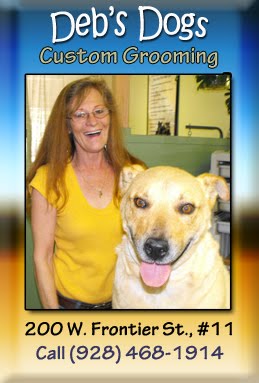TOP: MaryBeth Scanlon and her husband, Tim Scanlon, shown with their daughter, recently expanded from a mobile kitchen into a downtown pub and restaurant. (Cronkite News Service Photo by Xi Chen)
BOTTOM: Although it has a restaurant now, Short Leash Hot Dogs still operates a food truck and trailer. (Cronkite News Service Photo by Xi Chen)
By XI CHEN
Cronkite News Service
PHOENIX – Brad Moore and his wife, Kat, spent three years selling gourmet wieners out of a trailer before expanding Short Leash Hot Dogs this year into a 50-seat restaurant in downtown Phoenix.
The Moores still use that trailer – plus a food truck added later – but Brad said he’s happy to also be where customers always can find him. And working in air-conditioned comfort is a plus.
“At some point you just want to get out of the heat and the summertime,” he said.
Moore, who also is chairman of the Phoenix Street Food Coalition, said the transition to a restaurant, in his case shared with a food truck operator who offers pies, is a natural one for an entrepreneur with the right product.
“I think if you can run a successful food truck, you can run a successful restaurant because you learn so much about the business and people and what your customers want,” he said.
MaryBeth Scanlon and her husband, Tim Scanlon, followed the same route with Pizza People, which recently expanded from a mobile kitchen into a downtown pub and restaurant.
The benefits: more hours, more seating, more revenue.
“For us, it was necessary,” MaryBeth Scanlon said. “Our food truck could only make it so far financially, and for us to grow to the point that we wanted to we have to have a brick-and-mortar location.”
She said many suppliers won’t deliver to food trucks, forcing the couple to spend a lot of time driving to buy ingredients and other necessities.
“It’s difficult to get the truck up to the amount of shifts per week needed to profit,” Scanlon said.
Michael Brown, owner of Jamburrito, a food truck offering Cajun burritos, said he wants to have a restaurant eventually but finds a mobile operation a good way to enter the market with a smaller investment.
“The truck is a powerful marketing tool to build a brand, and it helps me plan a location,” he said.
Steve King, a partner at Emergent Research, a Lafayette, Calif.-based small-business research and consulting firm, said it’s common for aspiring restaurateurs to test products, build credibility with potential investors and minimize risk by entering the market with food trucks.
“The recession ended up with making it very hard to find capital to build a traditional restaurant, so you have these food trucks as a starting point,” he said.
King called moving on to a restaurant a logical next step.
“Food trucks are limited by their size in terms of how successful they could be,” he said. “But what happens is they will be modestly successful with the food truck and based on that success they decide to build a brick-and-mortar.”
Rick Murray, CEO of the Arizona Small Business Association, said running a food truck is a smart way to get into the industry.
“I think it is a genius idea to test a product before you really go all in,” he said.
“Restaurants open and close every single day,” Murray added, “and if you really don’t know who your audience is, you’d be gone in a week.”
The Moores’ food trailers offer gourmet hot dogs with more than 20 toppings, including a signature wiener wrapped in a warm naan bread and topped with mango chutney, diced jalapeños, red onions, fresh cilantro and mayo.
Brad Moore said starting out with a trailer enabled the couple to make adjustments based on customer feedback.
“You can go out, you can reach customers directly, you can make changes quickly, and it gives you that flexibility to kind of experiment with different things before you actually move into a restaurant,” he said.
The couple developed a loyal following by stationing the trailer at First Fridays before deciding it was time to grow into a permanent location near the Phoenix Public Market, where they got their start.
“It’s been nice to have a place to call my own and you can tell customers, ‘If you can’t find the food truck, the restaurant is right here and it is open five days a week,’” Brad Moore said.
• Restaurant: $250,000-$500,000
Source: Intuit Research
• Restaurants: $631 billion
Source: National Restaurant Association
Cronkite News Service
PHOENIX – Brad Moore and his wife, Kat, spent three years selling gourmet wieners out of a trailer before expanding Short Leash Hot Dogs this year into a 50-seat restaurant in downtown Phoenix.
The Moores still use that trailer – plus a food truck added later – but Brad said he’s happy to also be where customers always can find him. And working in air-conditioned comfort is a plus.
“At some point you just want to get out of the heat and the summertime,” he said.
Moore, who also is chairman of the Phoenix Street Food Coalition, said the transition to a restaurant, in his case shared with a food truck operator who offers pies, is a natural one for an entrepreneur with the right product.
“I think if you can run a successful food truck, you can run a successful restaurant because you learn so much about the business and people and what your customers want,” he said.
MaryBeth Scanlon and her husband, Tim Scanlon, followed the same route with Pizza People, which recently expanded from a mobile kitchen into a downtown pub and restaurant.
The benefits: more hours, more seating, more revenue.
“For us, it was necessary,” MaryBeth Scanlon said. “Our food truck could only make it so far financially, and for us to grow to the point that we wanted to we have to have a brick-and-mortar location.”
She said many suppliers won’t deliver to food trucks, forcing the couple to spend a lot of time driving to buy ingredients and other necessities.
“It’s difficult to get the truck up to the amount of shifts per week needed to profit,” Scanlon said.
Michael Brown, owner of Jamburrito, a food truck offering Cajun burritos, said he wants to have a restaurant eventually but finds a mobile operation a good way to enter the market with a smaller investment.
“The truck is a powerful marketing tool to build a brand, and it helps me plan a location,” he said.
Steve King, a partner at Emergent Research, a Lafayette, Calif.-based small-business research and consulting firm, said it’s common for aspiring restaurateurs to test products, build credibility with potential investors and minimize risk by entering the market with food trucks.
“The recession ended up with making it very hard to find capital to build a traditional restaurant, so you have these food trucks as a starting point,” he said.
King called moving on to a restaurant a logical next step.
“Food trucks are limited by their size in terms of how successful they could be,” he said. “But what happens is they will be modestly successful with the food truck and based on that success they decide to build a brick-and-mortar.”
Rick Murray, CEO of the Arizona Small Business Association, said running a food truck is a smart way to get into the industry.
“I think it is a genius idea to test a product before you really go all in,” he said.
“Restaurants open and close every single day,” Murray added, “and if you really don’t know who your audience is, you’d be gone in a week.”
The Moores’ food trailers offer gourmet hot dogs with more than 20 toppings, including a signature wiener wrapped in a warm naan bread and topped with mango chutney, diced jalapeños, red onions, fresh cilantro and mayo.
Brad Moore said starting out with a trailer enabled the couple to make adjustments based on customer feedback.
“You can go out, you can reach customers directly, you can make changes quickly, and it gives you that flexibility to kind of experiment with different things before you actually move into a restaurant,” he said.
The couple developed a loyal following by stationing the trailer at First Fridays before deciding it was time to grow into a permanent location near the Phoenix Public Market, where they got their start.
“It’s been nice to have a place to call my own and you can tell customers, ‘If you can’t find the food truck, the restaurant is right here and it is open five days a week,’” Brad Moore said.
Average startup costs:
• Food truck: $55,000-$75,000• Restaurant: $250,000-$500,000
Source: Intuit Research
U.S. restaurant industry revenue, 2012:
• Food trucks: $650 million• Restaurants: $631 billion
Source: National Restaurant Association










No comments:
Post a Comment